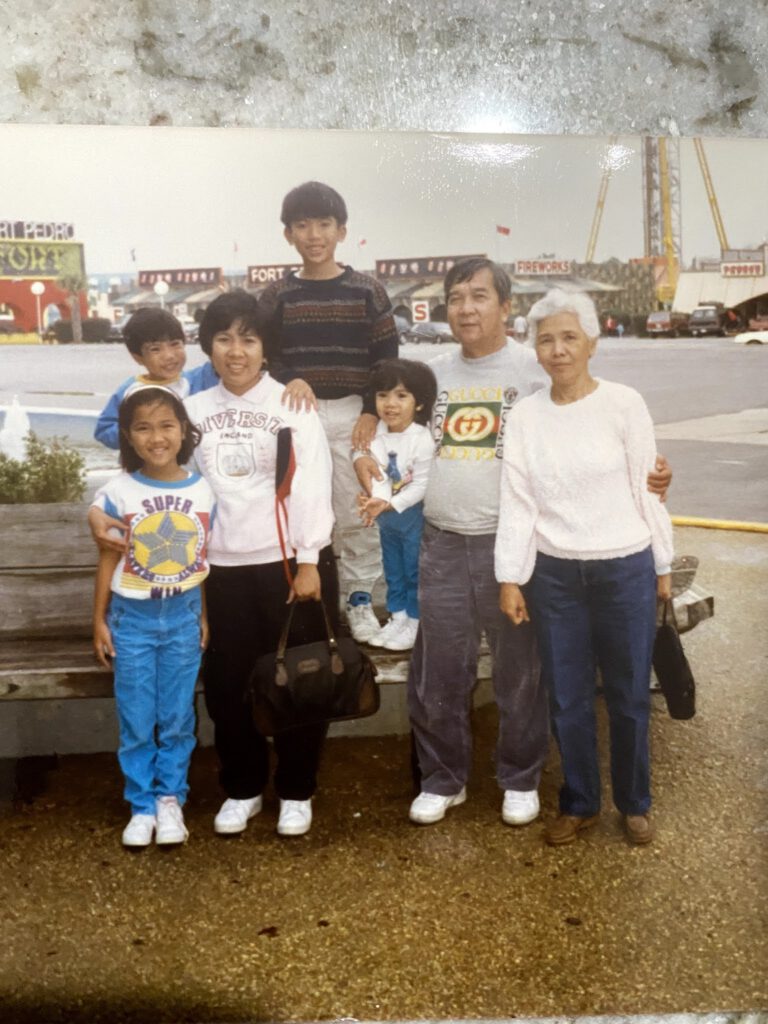by Kimberly Nario
Sometimes it feels like I grew up in a hospital. When I was a kid, my mom and several aunties worked at hospitals across Hampton Roads. It was common for my dad to drop me off in the middle of my mom’s shift so I could spend an afternoon bouncing between the reception area and the gift shop. The penny bubble gum was my favorite. You know the kind — the one where the flavor lasts for only five seconds. Eventually, I’d make my rounds, visiting aunties in their nursing stations, going to the cafeteria for a sweet treat with some, and always making sure to say hello to my ninang (Tagalog for godmother), who would be starting her night shift, just as my mom and I were heading home.

Back then, it didn’t seem odd to me that so many of the elders in my life worked in hospitals. Now, as an adult, when I think about it, everything makes sense. Labor is one of the Philippines’ highest exports, and domestic work are popular ways of getting visas to the United States and achieving the “American Dream.” For many immigrants, part of that dream includes continuing to take care of family back home, usually by sending supplies or money. Shoutout to anyone who has ever filled a balikbayan box (a box filled with food, clothing, household items, and gifts, shipped from a Filipino living overseas to friends and family back home).
What I’m about to say shouldn’t matter, but I’ll say it, anyway. I was born and raised in Virginia. I say this because I still meet people who assume that I wasn’t. Despite continuously being othered and sometimes even hated, I’m proud of my heritage, and celebrate the customs and culture. No amount of hatred or vile insults spewed towards immigrants or other people like me will ever change that.
Immigrants took care of this country before the pandemic, and they’re taking care of it still. They’re working at farms harvesting crops, so we have food on our tables. They’re in hospitals, risking their health to save ours. They’re taking care of our homes and families when we’re too busy or tired to do it ourselves. Immigrants are the backbone of our country. So why are we collectively so quiet about the rise of hate crimes against Asians?
In the early days of the pandemic, I was on a grocery run with my dad. While stopped at a red light with my window down, we noticed a man on the sidewalk. Actually, I noticed him notice us. And it was clear that he didn’t like what he saw. He blamed the pandemic on us. He accused us of things. He made threats. I felt my teeth grinding, a pain shoot between my eyes, and my nails dig into my palm. What would have happened to my dad if I wasn’t there?

Anti-Asian hate crimes increased by almost 150% in 2020. Virginia has a population of over 580,000 Asian American and Pacific Islander (AAPI) identifying people. That’s over half a million people across the Commonwealth who are increasingly more vulnerable to hate crimes, simply by existing. But that existence is rarely represented, as we are regularly ignored by the media. During the 2021 General Assembly, Delegate Kathy Tran spoke about anti-AAPI hate crimes. This acknowledgment, especially coming from an Asian American elected official, was monumental. But it’s not enough for us to talk about ourselves. We need you to talk about us, too.
We didn’t create this problem. But together, we can begin to fix it. It’s not enough to say we aren’t racist. We need to be actively anti-racist. It’s an action, a conscious effort. Sharing infographics on Instagram is great for awareness. But where is your anti-racism beyond social media? We’re talking about combating white supremacy. The best way to tackle any problem is through preparation. By taking a bystander intervention training, we can all be better prepared to know how to tackle anti-Asian hate and racism when we encounter it.

I know that for me, it feels different to walk around the world now versus just over a year ago. Sometimes I smile less at strangers because I don’t want to draw attention to myself. Sometimes I smile more because I want them to see that I’m not a threat. And it’s all behind a mask. It’s exhausting. To put it plainly, I walk around scared — for myself, my family, my friends. So if you’re able to walk around the same way you did just over a year ago, and you saw someone notice me the same way the man on the sidewalk noticed me, would you do anything, or would you keep walking? My community deserves to feel safe, and we need to know you have our back.
Read our other blog posts about immigrant justice in Virginia:
• Virginia’s Universities Are Now Open to All Virginia Residents!
• We Need to Take Care of the Folks Who Put Food On Our Table